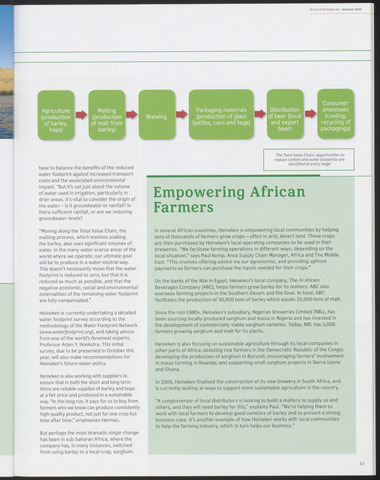Empowering African
Farmers
World ofHeineken 42 - summer 2010
have to balance the benefits of the reduced
water footprint against increased transport
costs and the associated environmental
impact. "But it's not just about the volume
of water used in irrigation, particularly in
drier areas. It's vital to consider the origin of
the water - is it groundwater or rainfall? Is
there sufficient rainfall, or are we reducing
groundwater levels?
"Moving along the Total Value Chain, the
malting process, which involves soaking
the barley, also uses significant volumes of
water. In the many water-scarce areas of the
world where we operate, our ultimate goal
will be to produce in a water-neutral way.
This doesn't necessarily mean that the water
footprint is reduced to zero, but that it is
reduced as much as possible, and that the
negative economic, social and environmental
externalities of the remaining water footprint
are fully compensated."
Heineken is currently undertaking a detailed
water footprint survey according to the
methodology of the Water Footprint Network
www.waterfootprint.organd taking advice
from one of the world's foremost experts,
Professor Arjen Y. Hoekstra. This initial
survey, due to be presented in October this
year, will also make recommendations for
Heineken's future water policy.
Heineken is also working with suppliers to
ensure that in both the short and long term
there are reliable supplies of barley and hops
at a fair price and produced in a sustainable
way. "In the long run, it pays for us to buy from
farmers who we know can produce consistently
high-quality product, not just for one crop but
time after time," emphasises Herman.
But perhaps the most dramatic single change
has been in sub-Saharan Africa, where the
company has, in many instances, switched
from using barley to a local crop, sorghum.
In several African countries, Heineken is empowering local communities by helping
tens of thousands of farmers grow crops - often in arid, desert land. These crops
are then purchased by Heineken's local operating companies to be used in their
breweries. "We facilitate farming operations in different ways, depending on the
local situation," says Paul Kemp, Area Supply Chain Manager, Africa and The Middle
East. "This involves offering advice via our agronomist, and providing upfront
payments so farmers can purchase the inputs needed for their crops."
On the banks of the Nile in Egypt, Heineken's local company, The Al Ahram
Beverages Company (ABC), helps farmers grow barley for its maltery. ABC also
oversees farming projects in the Southern Desert and the Sinai. In total, ABC
facilitates the production of 30,000 tons of barley which equals 25,000 tons of malt.
Since the mid-1980s, Heineken's subsidiary, Nigerian Breweries Limited (NBL), has
been sourcing locally produced sorghum and maize in Nigeria and has invested in
the development of commercially viable sorghum varieties. Today, NBL has 5,000
farmers growing sorghum and malt for its plants.
Heineken is also focusing on sustainable agriculture through its local companies in
other parts of Africa: assisting rice farmers in the Democratic Republic of the Congo;
developing the production of sorghum in Burundi; encouraging farmers' involvement
in maize farming in Rwanda; and supporting small sorghum projects in Sierra Leone
and Ghana.
In 2009, Heineken finalised the construction of its new brewery in South Africa, and
is currently looking at ways to support more sustainable agriculture in the country.
"A conglomerate of local distributors is looking to build a maltery to supply us and
others, and they will need barley for this," explains Paul. "We're helping them to
work with local farmers to develop good varieties of barley and to present a strong
business case. It's another example of how Heineken works with local communities
to help the farming industry, which in turn helps our business."
15

